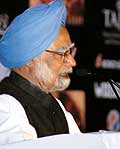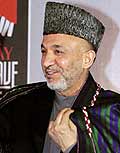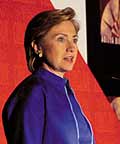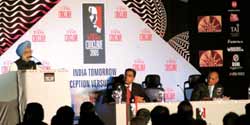 |
| Key notes: (L-R) PM Manmohan Singh
addresses the conclave as India Today's Aroon Purie and Prabhu
Chawla look on |
As
an attendee of the fourth India Today Conclave, held at Delhi's
Taj Palace Hotel on February 25 and 26, you could have listened
to the voices, watched the show, or even paused to ponder the
bamboo shoots to be spotted all over the place. If there was a
mistaken elephant in the hall, so was there an invisible panda.
The Conclave's theme: 'India Tomorrow: Perception versus Reality'.
And thus began the "playhouse of ideas",
in the words of Aroon Purie, Editor-in-Chief of India Today, to
redeem an India trapped between perception and reality. "For
reality," as he elaborated, "is more comprehensible
and manageable."
 The
inaugural keynote address, delivered by Hamid Karzai, President
of Afghanistan, sought to clear the perceptual haze surrounding
his country as a haven for extremists. "The people of Afghanistan
have always consulted each other," he said, referring to
the country's 'loya jirgas' in affirmation of democracy. He spoke
of female empowerment, quoted Robert Frost's "miles to go"
poem in Nehruvian empathy, and asked for cooperation from all
of South Asia for a "future full of promise and opportunity". The
inaugural keynote address, delivered by Hamid Karzai, President
of Afghanistan, sought to clear the perceptual haze surrounding
his country as a haven for extremists. "The people of Afghanistan
have always consulted each other," he said, referring to
the country's 'loya jirgas' in affirmation of democracy. He spoke
of female empowerment, quoted Robert Frost's "miles to go"
poem in Nehruvian empathy, and asked for cooperation from all
of South Asia for a "future full of promise and opportunity".
Writer V.S. Naipaul, next
up, spoke on identity and ideals, calling in particular for the
need to live with the idea of imperfections, "one type replacing
the other".
If the economic potential
in peace needed articulation, Shaukat Aziz, Prime Minister of
Pakistan, did just that. Live via satellite, he urged intellectuals
to "act as a vanguard of change by resisting the urge to
see the future through the prism of the past" on matters
South Asian. The man credited with having averted the perils of
a laggard Pakistani economy went on to spell out his Indo-Pak
peace formula: mutual linkages to lead the way to an assured South
Asian century... provided, and there was no escape from this reference,
the issue of Kashmir were to be resolved mutually. It could be
done, he added, if both sides could overcome their "conditioned
reflexes".
But was India really a
part of the Asian emergence story? Oh yes, affirmed Pascal Lamy,
President, Association Notre Europe and Associate Professor, Institut
d' Etudes Politiques, Paris, highlighting India's advantages.
"India could bring to the world democracy, social inclusion
and sustainable social development." Rahul Bajaj, Chairman
and Managing Director, Bajaj Auto, urged the audience to be positive
but realistic about India's prospects. "It is in the us interest
to keep Asia divided," he said, "as it was in the us
interest to see a united Europe."
|
|
|
|
|
"The world wants
India to do well. Our
real challenges are at home"
Manmohan Singh
Prime Minister of India
|
"We must seize
the opportunity of the 'global village', by creating our
own 'regional village"
Hamid Karzai
President of Afghanistan
|
"Americans understand
that an economically
vibrant, democratic India is good for the US"
Hillary Rodham Clinton
Us Senator & Former First Lady
|
According to Yashwant Sinha,
a former Union Minister of India, the country's image had changed,
but still needed political and administrative reforms. Jagdish
Bhagwati, Professor, Columbia University, spoke of the Indian
diaspora: "The perception of out migration of our skilled
citizens has changed from concern to celebration, from trauma
to triumphalism." The world's richest Indian L.N. Mittal,
advised the audience "to focus not on the loss of diaspora,
but on how this Brain Drain can be turned into a Net Gain."
Writer William Dalrymple
almost echoed that view, talking of the influence of overseas
writers of Indian descent (and others of hyphenated identity)
on literature. Actor Amitabh Bachchan was dramatic. In his inimitable
manner of voice, he announced himself there "neither to praise
nor bury cinema". But proceeded, nonetheless, to make an
endearing case for the relevance of Hindi cinema, in all its musical
uniqueness, to the very real cause of India's well-being.
The voice heard next had
its peak moments of keynote emphasis too, with "rule
of law" notching up a repeat mention. It was the dinner address
of Manmohan Singh, Prime Minister of India, who commended India
Today for providing a platform for dialogue as a crucial part
of democracy, before articulating his reading of Elections 2004:
a vote to recommit India to the principles of its Constitution.
And thus, a mandate to work under the reality of "an inclusive
and open society, a multi-cultural, multi-ethnic, multi-lingual
society". An open economy, too. "An economy that guarantees
the freedom of enterprise, respects individual creativity, and
at the same time mobilises public investment for social infrastructure
and the development of human capabilities."
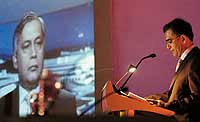 |
"Pakistan and
India are capable of leading South Asia to new horizons of
economic development"
Shaukat Aziz
Prime Minister of Pakistan |
The
business session had Kumar Mangalam Birla, Chairman, Aditya Birla
Group, speaking of the imperative of turning India into a global
manufacturing hub. The good news: the reality-perception gap overseas
is narrowing (going by the Google searches for India in relation
to 'China' beating those in relation to 'Maharaja'), and global
factors are converging to propel India's success. Tom Stewart,
Editor, Harvard Business Review, mentioned India's importance
in terms of business readership and education, and said that this
time round, India actually needed to turn into a world manufacturer.
The pressure was such. "In a globalised world," he added,
"Indian manufacturing needs to be driven by development of
strong companies."
Nothing
so far could've prepared the audience for the debate that was
to follow. The topic: 'Spirituality: Halo or Hoax?' Spiritual
guru Sri Sri Ravi Shankar made an impassioned plea to have people
connect with their spiritual selves, enchanting the audience with
talk of needs beyond the immediate. Lyricist Javed Akhtar was
unimpressed. He used arguments of incisive rationality to pop
the halo of spirituality and its claim to holiness. "It is
not enough to just teach the rich how to breathe," he scoffed,
after a rousing espousal of justice as the truly striven-for cause
of all those held aloft ages after their lifetimes. Ravi Shankar,
to his credit, didn't let his blissful visage drop.
L.K.
Advani, India's former Deputy Prime Minister, addressed the Conclave
on whether good economics spelt bad politics. He laid the blame
for his party's lost election on a campaign based on "a purely
positive plank". Also, as he reflected, "Just because
our performance in the economic field did not yield a renewed
electoral mandate, it is not right to conclude that reform-oriented
economics is bad politics."
Whether
India's IT & ITEs sector was a 'Brain Powerhouse' or a 'Back
Office Plodder' was the topic under discussion next. Joseph Sigelman,
Co-CEO, OfficeTiger, spoke of how sophisticated the work was that
was now getting outsourced to India. Why, he asked, club call
services with industrial design? Kiran Karnik, President, nasscom,
rephrased the topic as "Brain Bank or Cyber Coolie",
and termed all these mere caricatures of a rather more complex
reality. That done, he held aloft the potential for innovation
in a country of such diversity.
Diversity
talk stayed in the air, as a discussion on the 'Real Indian' got
underway. Mani Shankar Aiyar, Minister, Petroleum & Natural
Gas, was quite clear that a real Indian is that person who believes
everyone else who's Indian to be equally Indian, and celebrates
pluralism thus. Arun Shourie, former Disinvestment Minister, chose
not to confront Aiyar's thesis directly on the issue of identity,
but drew attention to some Indian experiences that were not quite
in harmony with Aiyar's.
Thus
did the fourth India Today Conclave come to its grand gala dinner
finale: the keynote address by Hillary Clinton, Member of the
us Senate. Described as a 'President-in-waiting', Senator Clinton
opted to play realistic rather than optimistic about her shot
at the Oval Office. Speaking on 'India's Role in the New Global
Order', and dressed in turquoise blue, she cited a report by the
United States National Intelligence Council illustrating how "India
could emerge as the world's fastest growing economy as we head
towards 2020." She also adopted some plainspeak on her position
on such American nationalist issues as outsourcing and security,
striking a hard sense of realism again. If irony had to appear,
it did-in the form of a Mark Twain quote on India's maternal greatness.
It appealed vividly to her, she said, as a mother herself.
|





 The
inaugural keynote address, delivered by Hamid Karzai, President
of Afghanistan, sought to clear the perceptual haze surrounding
his country as a haven for extremists. "The people of Afghanistan
have always consulted each other," he said, referring to
the country's 'loya jirgas' in affirmation of democracy. He spoke
of female empowerment, quoted Robert Frost's "miles to go"
poem in Nehruvian empathy, and asked for cooperation from all
of South Asia for a "future full of promise and opportunity".
The
inaugural keynote address, delivered by Hamid Karzai, President
of Afghanistan, sought to clear the perceptual haze surrounding
his country as a haven for extremists. "The people of Afghanistan
have always consulted each other," he said, referring to
the country's 'loya jirgas' in affirmation of democracy. He spoke
of female empowerment, quoted Robert Frost's "miles to go"
poem in Nehruvian empathy, and asked for cooperation from all
of South Asia for a "future full of promise and opportunity".